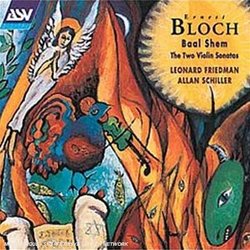| All Artists: Bloch, Friedman, Schiller Title: Violin Sonatas 1 & 2 / Baal Shem Members Wishing: 0 Total Copies: 0 Label: Asv Living Era Release Date: 12/16/1993 Genre: Classical Styles: Chamber Music, Instruments, Strings Number of Discs: 1 SwapaCD Credits: 1 UPC: 743625071429 |
Search - Bloch, Friedman, Schiller :: Violin Sonatas 1 & 2 / Baal Shem
 | Bloch, Friedman, Schiller Violin Sonatas 1 & 2 / Baal Shem Genre: Classical
|
Larger Image |
CD Details |
CD ReviewsNot competitive with the best versions but the only recordin Discophage | France | 05/20/2007 (3 out of 5 stars) "Leonard Friedman and Allan Schiller's recording of Bloch's violin and piano sonatas was the third to be published on CD, in 1990, after those by Galperine and Aguessy on Adda (Bloch:Violin Sonatas) and the Weilerstein duo (spread on two Arabesque CDs, with the composer's complete music for violin and piano: Ernest Bloch: Complete Music For Violin And Piano, Volume 1 and Bloch: Complete Music For Violin And Piano, Volume II). As the latter, they are unfortunately not entirely up to the daunting challenges presented by Bloch's brutal and massive First Sonata. Granted Bloch's piece doesn't call for sweet and mellow sounds, but Friedman's tone is a bit too wiry for comfort, and even pitch-insecure in some places, as in the first movement's octave trills in the passage starting at 10:28. Schiller tends to over-pedal and thus robs the music of some of its snap. Their first movement is broad, and given those limitations the nagging doubt sets in that some of the player's comfortable-to-plodding tempos were dictated by technical concerns rather than interpretive choice. The same doubt applies to their finale, where Bloch's "Moderato" indication does allow for the, well, moderate tempo they adopt, but certainly not for their lack of animation at 5:08, where the composer writes "animato". The overall effect is frankly plodding.
On the other hand they aptly conjure the mood of appeased serenity in the sonata's closing pages, and likewise offer a fairly good realization of Bloch's "molto quieto" second movement, though lacking the tonal beauties of Stern (see my review of Hindemith, Copland: Violin Sonatas; Bloch: Violin Sonata; Baal shem), Aaron Rosand (in a disc called "Hebraic Legacies" on Audiofon) or Elmar Oliveira (a Vox Box in which "Elmar Oliveira plays Brahms, Strauss, Sarasate and others"); the movement is further marred by a lack of animation in the more dramatic passages ("animato e appass. poco a poco", between 5:00 and 6:30), added to Friedman's difficulties in the arpeggios at 5:46. The two other compositions don't place such daunting requirements on the performers' technique, so Friedman's technical limitations aren't so penalizing. In the Second Sonata his technique and pitch accuracy are strained in some spots and his tone production lacks beef in the upper reaches, but he shows commendable attention to Bloch's accents and tempo relationships and his phrasings display remarkable imagination in response to the composer's solicitations. Tempos are ample and elicit a fine mood of contemplative serenity but tend to be a bit placid in some of the animated passages. In "Vidui (Contrition)", the first movement of "Baal Shem", he conjures a fine mood of restraint and interrogation. But again his immoderate adoption of moderate tempo gives too much of a sense of plodding to "Nigun (Improvisation)" - compare his 7:00 to Stern's 6:15, Rosand's 6:12 and even to Oliveira's 6:38 - and fails to convey any sense of rejoicing in "Simchas Torah (Rejoicing)", which he takes in 4:50, against 4:35 for Stern, 4:17 for Oliveira and 4:04 for Rosand, while his thin and wiry tone production is again (too) much in evidence in both these movements. This is not competitive then with the best versions, but still it has the immense advantage of being the only recording I know to present on one disc Bloch's three big masterpieces for violin and piano. If you are looking for convenience, this might be of interest, but if you are in for interpretive excellence you'd better skip this one. In the First Sonata and Baal Shem, Stern is unique and another excellent recording is Oliveira's, while Rosand is good too; you can complete any of these without duplication with Sergiu Schwartz' excellent reading of the Second Sonata on Poème Mystique; and if it is the Sonatas you are after, among the recordings I have heard Aguessy and Galperine, mentioned above, have turned out a good version as well. " |

 Track Listings (7) - Disc #1
Track Listings (7) - Disc #1